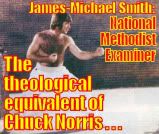So, we saw last time that the famous "Immanuel" passage in the Christmas story comes from a prophecy in Isaiah ch.7. The prophecy in its original context did not foretell a future Messiah who would be born of a literal "virgin" (b'thulah), but rather, an impending birth of a child by a "young woman" or "maiden" ('almah).
We also saw that centuries after the prophecy was spoken by Isaiah, and over a century before Jesus' birth from a literal virgin, Jewish translators who translated the Hebrew text into the widely-spoken Koine Greek language translated Isaiah's 'almah with the Greek word for virgin, parthenos.
It is this text that Matthew pointed his readers to as having been by Jesus' virgin birth. So the question remains: How did Jesus' birth "fulfill" a prophecy spoken 700 years beforehand about a young woman giving birth to a child in King Ahaz's day?
It all hinges on what Matthew means by the word "fulfill."
When we say something "fulfilled" something spoken long ago, we immediately think of a prediction that then comes to pass. This is a perfectly valid meaning of "fulfill." But it's not the only meaning...and it's not the one that the NT writers most often mean.
Rather, when they speak of Jesus as having "fulfilled" the Scriptures, they mean that in His life, death and Resurrection, Jesus has relived, reenacted, or recapitulated the story of Israel found in her Scriptures. In other words, He has "filled fully" the story found in the text.
What does this mean?
Well, it means that when Matthew says Jesus' birth to a parthenos is the fulfillment of Isaiah 7's promise to Ahaz that "the 'almah (Heb.)/parthenos (Gk.) will give birth to a son and will call him 'Immanuel'", he IS NOT claiming that Isaiah 7 is making a future prediction about Jesus Himself being born of a virgin. Rather, Matthew is looking at the story of Israel as a whole, and in this case Isaiah's account of the seige of Jerusalem during Ahaz's time, and claiming that Jesus is repeating in his own life the story of Israel as a people...but where they failed, He will succeed.
We don't normally catch this meaning when reading Matthew 1-2 because often we are not very familiar with the original Scriptures Matthew is citing or their historical setting. But if we were, as Matthew's 1st century Jewish readers were, we would see that Matthew is using very well-accepted and widely-used Jewish interpretive methods of his time to make this point. He is keying in on certain terms that link Jesus' story with that of Israel. As Michael Brown notes in his EXCELLENT work on this passage:
For Matthew—rightly so—the Hebrew Bible was the Messiah’s Bible, and therefore, given that (1) Yeshua was literally Immanuel, God with us, (2) the Immanuel prophecy was clearly directed to the house of David, (3) Miriam, Yeshua’s mother was an ʿalmah who had never known a man, and (4) the surrounding context in Isaiah contained highly significant Messianic prophecies, it is no wonder that Matthew pointed to Isaiah 7:14 as being “fulfilled” in the birth of Jesus the Messiah. Who else fulfilled it? Or put another way, since Matthew knew beyond a doubt that Jesus was the Messiah and since he knew that Yeshua was born of a virgin, was he wrong to quote Isaiah 7:14 in reference to Yeshua’s miraculous birth? Was it not another important link in the chain of promises and prophecies given to David and his line?
Michael L. Brown, Answering Jewish Objections to Jesus, Volume 3: Messianic
Prophecy Objections (Grand Rapids, Mich.: Baker Books, 2003), 28.
Basically what Matthew is saying to his readers is this:
"Hey, you know how in our Scriptures it talks about God giving a sign to Israel that the birth of a child named 'Immanuel' would herald their salvation from the threat posed by the seemingly unstoppable enemy surrounding them? Well God did it again! But this time He did it on a universal scale! This time another young maiden (who actually was a virgin!) gave birth to a son. And instead of just being named 'Immanuel', which means 'God-with-us", this son actually turns out to LITERALLY be God with us! And just as Immanuel's birth heralded the impending defeat of Israel's enemy Assyria, this "Immanuel's" birth heralds the impending defeat of Israel's ultimate enemy, the Evil One himself! Our people's story is being filled fully with new meaning in the person and work of this child born in Bethlehem! The story if Israel in Isaiah 7-11 is being relived through the arrival of her long-awaited Messiah, Jesus! This is indeed Good News ("Gospel"). There's a new Immanuel being born, who's actually "Immanuel" in the fullest sense! Israel's deliverance is near! "
But what ended up being so shocking about this "fulfillment" was the means by which Israel's (and the world's!) deliverance would come about...
Blessings and have a wonderful 2009!
JMS











